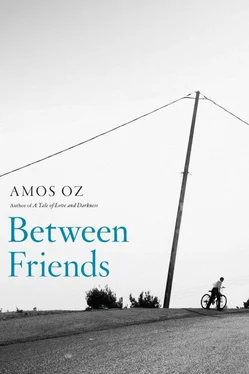Yoav drew back, then focused his eyes in the darkness, pulled Nina by the arm to the nearby streetlamp, and asked worriedly if she was cold and how long she’d been waiting there alone. Nina was a young woman known on the kibbutz for her strong, unwavering opinions. She had green eyes, long lashes, and thin, finely sculpted lips. Her forehead shone in the dark and her blond hair was cropped short.
“Tell me what you would do, Yoav, if you had to live every day and sleep every night of your whole life with someone who repulses you. Has repulsed you for years. The things he says, his smell, his jokes, his scratching, his hiccups, his coughing, his snoring, his nose-picking. Everything. What would you do?”
Yoav put his hand on her arm and said, “Tell me exactly what happened, Nina.”
In the light of the streetlamp, he saw that her face was pale and tense, but her tired green eyes, looking straight into his, held not a single tear. She clenched her lips and said, “Nothing happened. He even argues with the announcer on the radio.” Then she said, “I can’t take it anymore.”
“Can we wait till tomorrow? Come to my office tomorrow and we’ll talk. There are things that seem terrible at night but in the light of day, they look completely different.”
“No. I won’t go back to him. Not tonight, not ever. Give me a room tonight, Yoav. Even in a shed. In a lean-to. You must have one empty room.”
“Tell me what happened.”
“There’s nothing to tell. I just can’t go on any longer.”
“And the children?”
“The children will come straight to me from the children’s house every afternoon. To the room you give me.”
Yoav felt uncomfortable standing and talking to Nina in the dim light of the streetlamp in the narrow alleyway between the cold-storage room and the fertilizer shed. If anyone happened to walk past and see them standing there, whispering, rumors would fly tomorrow. He said firmly, “Nina. I’m sorry, but I really can’t arrange something like this in the middle of the night. I don’t have rooms in my pocket, you know. I’m not the one who allocates rooms here. The committee will have to discuss it. And I’m on guard duty now. Please go home to sleep and we’ll meet tomorrow and try to find a solution together.”
But even as he spoke, he backtracked and found himself adding in a different tone of voice, “Okay, come with me. We’ll go to the office. There’s a key to the lecturers’ guest room hanging there. You can spend the night in the guest room and come back tomorrow so we can figure out what to do. I’ll speak to Avner tomorrow too.”
She leaned toward him, took his hand in both of hers, and pressed it tightly against her breast. Yoav was embarrassed and even blushed slightly in the dark because Nina was an attractive woman who more than once had played a role in his secret fantasies. At seventeen, he’d been in love with her for a while, but never dared approach her. At school, Yoav had been a shy, introverted boy and Nina was already attracting the pick of the boys. Even now, her face etched with bitterness and fatigue and her body not as perfect as it used to be, she was still an attractive woman. We were all surprised when she married Avner Sirota, of all people, and bore him two sons. Avner was rowdy and given to brawling. His neck was so short that his square, shaved head seemed to rest heavily on his shoulders, and his arms were as beefy as a boxer’s. He was a bit afraid of Nina, as if she knew an embarrassing secret about him. Even so, sometimes, in his coarse, joking way, he pursued high school girls behind her back. He was roughly affectionate to his two little boys and on summer nights encouraged them to wrestle with him on the lawn. He was always arguing politics in his hoarse voice, disparaging the heads of government, whom he dismissed as old-world weaklings. If they’d only given him and his paratrooper buddies a free hand for a month, he’d say, only a month to give the Arabs what they deserve, we’d have had peace and quiet here for a long time now. He’d stand in the square in front of the dining hall or on one of the paths, smoking and arguing with you, and Nina would wait beside him, head down, listening silently until she was sick and tired of it and put her hand on his back, interrupting him in her low, decisive voice, “Avner. I think that’s enough for today. Let’s get going.”
Avner would immediately cut short his lecture and follow her. Roni Shindlin called them the little gypsy and her dancing bear.
Yoav asked, “Won’t Avner be looking for you?”
“He was asleep when I got dressed and left.”
“And if he wakes up and finds you gone?”
“He won’t wake up. He never wakes up.”
“And when he gets up in the morning? Did you leave him a note?”
“I have nothing to say to him. When he gets up in the morning he’ll think I went to work early without waking him. We don’t talk very much.”
“And later? What’ll happen?”
“I don’t know.”
“There’ll be a lot of talk. People will talk. The whole kibbutz will talk.”
“So let them.”
Yoav suddenly longed to press her slender body against his, or to unbutton his coat and draw her inside, or at least to caress her cheek. The urge was so strong that his hand reached out involuntarily and stroked the quivering air around her hair. He was cold, and he assumed that Nina was even colder because her head was bare and she was wearing thin shoes.
“Let’s go,” he said. “We’ll find you a place for the night.”
She walked at his side, small, short-haired, half a step behind him because his stride was so long. He was a great deal taller than she and his shadow fell over hers. They passed the laundry and the shoemaker’s shed. The smell of damp earth and chicken droppings floated on the cold air. Low dark clouds crawled over the roofs and there wasn’t a star in the sky now. Yoav did a mental check of all the problems he’d have to deal with tomorrow and in the days that followed: Cheska had asked the kibbutz for permission to visit her family in Europe; Zvi Provizor needed a new lawn mower; Grandma Slava had bitten one of the kitchen workers; Roni Shindlin had gone into the children’s house one night and attacked a five-year-old; David Dagan had split up with Edna Asherov; they urgently needed to buy new equipment for the dental clinic; and now he also had to speak to Avner and find out if things could still be patched up, if this was a one-night crisis or another broken family.
Nina was three or four years younger than he, and when she was still a child, she had impressed Yoav with her independent spirit and soft-spoken tenacity. She’d come to us an orphan, sent by her grandfather to go to school here. From her first day, she was adamant in her opinions, and other people learned to respect her quiet persistence. At kibbutz meetings, she was often the only one, or almost the only one, to oppose the general view. After her military service, she volunteered to work with groups of youth offenders in outlying towns. Since her return, she had been working alone in the apiary and had turned it into such a successful kibbutz enterprise that beekeepers from other kibbutzim came to learn from her. When it was her turn to go to college, she insisted on studying social work even though the kibbutz general meeting had voted to send her to a college for preschool teachers. Nina headed the group of women on our kibbutz who rebelled against communal sleeping for young children, demanding that they spend their nights in their parents’ apartment. The kibbutz general meeting did not accede to their demand and Nina was determined to raise the subject for discussion year after year until the majority saw it her way.
Two or three months after a paratrooper unit of the Fighting Pioneer Youth joined the kibbutz, she chose from among their ranks Avner Sirota, hero of the retaliatory raid on Khirbet Jawad, and two months later, she was pregnant. The kibbutz was surprised, even disappointed, by her choice. Nevertheless, she was highly regarded among us because she knew how to listen silently and sympathetically and was always ready, in her quiet way, to help anyone who needed it. When Boaz suddenly left Osnat and moved in with Ariella Barash, Nina went to live with Osnat for a few days. And when none of the women would agree, under any circumstances, to work with Grandma Slava peeling vegetables on the back porch of the kibbutz kitchen, Nina volunteered to take on the job. Yoav still hadn’t spoken to anyone about it, but he was thinking of suggesting at the general meeting that they elect Nina secretary when he completed his term. And perhaps tonight was only a temporary crisis and tomorrow morning she would see things differently. After all, she was a responsible, rational person. You don’t break up a family just because your husband snores at night or insists on arguing with the radio announcer.
Читать дальше












